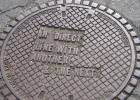
Diemer.ca
Radical Digressions
Samplings
The evidence from all OECD countries shows that the private sector is far more bureaucratic and much less efficient than the public sector when it comes to providing health care.
Ten Health Care Myths
Gentlemen from Hooker - and many other places - are quite literally pouring these and many other poisons into your coffee and your kids' juice. They just do it in a more indirect, anonymous, and apparently socially acceptable way.
150 Years of Dirty Water
Blogs
- Latest Post
- Notebook 10
- Notebook 9
- Notebook 8
- Notebook 7
- Notebook 6
- Notebook 5
- Notebook 4
- Notebook 3
- Notebook 2
- Notebook 1
Words of Wisdom
- Capital is reckless of the health or length of life of the laborer, unless under compulsion from society.
- – Karl Marx
Favourite Links
- Connexions
- CounterPunch
- Marxist Archive
- News & Letters
- Bureau of Public Secrets
- Noam Chomsky
- Middle East Resources
- Sources
- More Links...

Soil removal a possibility
By Ulli Diemer
A board of health liaison committee is studying the possibility of removing lead-contaminated soil from around houses in the South Riverdale area. Anywhere from 130 to 400 houses in the area south of Queen near the Canada Metals plant would be involved in the soil removal and replacement, which would cost about $1,000 per house.
The neighbourhood has long been plagued with lead pollution, which is associated with a number of serious health problems, and with learning disabilities in children.
The extent of the problem, as well as its source, have been subjects of controversy. Children have been monitored regularly for lead levels in their blood. A recent round of testing, to which 70 of the 460 under-six children in the area were brought, found that 13 of them (18.6 per cent) had lead levels of 20 micrograms per decilitre or more, a level which it is believed can cause learning disabilities. There is also concern that even significantly lower levels of lead can in the long run have adverse effects on the brain.
Accusing fingers have often been pointed at the Canada Metals Company on Eastern Avenue as the source of the problem. The company, in the area since 1925, has stoutly denied that it is to blame, suggesting that car exhaust fumes or lead-based paint might be responsible. Local health activists and residents have tended to agree that measures should be taken to reduce other sources of lead in the environment, such as leaded gasoline, but they have little doubt that Canada Metals has been the biggest problem in South Riverdale. It is highly improbable, after all, that children in the area have a collective compulsion to eat paint chips at a rate much greater than elsewhere in the city, where lead has been found to be much less of a problem.
Environmental monitoring over the last decade found Canada Metals in violation of permitted levels of pollution on countless occasions. The company has had to install $1 million worth of emission control equipment.
Area residents may have a sense of deja vu about the current proposal, being studied by the South Riverdale Liaison Committee, to truck away contaminated soil. A similar study was done in 1974, and the soil was finally removed in the summer of 1977 at a cost of $80,000. (The soil is seen as a hazard to children playing on the ground and to people eating vegetables grown in it.)
Less than two years after the previous removal an Ontario Environment Ministry official admitted that soil in the area had been found to be recontaminated. The Ministry had known about it for half a year before residents found out. Residents hadn't been told about the recontamination, according to the Ministry spokesperson, because “it would only upset them.”
Still, residents are hopeful that their lengthy campaign to eliminate or reduce the sources of lead pollution is having some success, and they would be relieved to see the soil go. In the meantime, they are being advised to make sure their kids get lots of iron and calcium in their diets. And to stop growing vegetables.
Published in Seven News, May 3, 1984